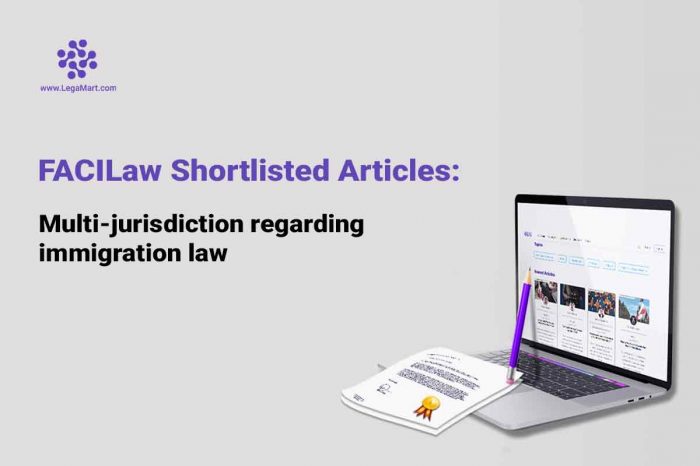Immigration Law
When discussing immigration, one might bring up issues like citizenship, family-based immigrant visas, investments, business immigration, and deportation. Immigration has developed into a contemporary conundrum that affects every person’s legal issues. There are four types of immigration law: family immigration, business immigration, asylum, and deportation. It is essential to acquire guidance from someone in the jurisdiction you are interested in because the immigration regulations of each country are different.
Practice Areas
By selecting each practices, we will filter related articles for you.
LegaMart Lawyers in Immigration Law
Latest Articles
More About Category
Tell us more about your problem.
Please give a brief description about what it is you need to talk to our lawyers about ?
Frequently Asked Questions
Can an expat or immigrant apply for asylum in a country other than their home country?
Yes, an expat or immigrant can apply for asylum in a country other than their home country. Asylum is a protection granted by a government to individuals who are fleeing persecution and cannot return to their home country due to a well-founded fear of persecution based on their race, religion, nationality, political opinion or membership in a particular social group.
The right to seek asylum is recognized under international law, including the 1951 Refugee Convention and its 1967 Protocol, which lay down the legal framework for refugee protection globally.
However, the process for seeking asylum varies from country to country, and there may be specific requirements that must be met. It is important to seek legal advice from a qualified attorney in the jurisdiction where you wish to seek asylum to understand the requirements and procedures involved.
It is also worth noting that seeking asylum in another country can be a complex process, and it may take some time before a decision is made on your case. In some cases, it may be advisable to seek the assistance of an immigration attorney or an authorized representative to help guide you through the process.
How is the asylum process different for unaccompanied minors?
The asylum process for unaccompanied minors is different from that of adults, and is generally designed to take into account their particular vulnerabilities and needs. Here are some ways in which the asylum process may differ for unaccompanied minors:
Guardianship: Unaccompanied minors are typically appointed a legal guardian to help them through the asylum process. The guardian may be a family member or a social worker.
Age determination: In some cases, the age of an unaccompanied minor seeking asylum may be disputed. Age assessment procedures may be used to determine their age in such cases.
Protection needs: The asylum process for unaccompanied minors may involve additional considerations related to their protection and well-being. For example, they may be housed in specialized shelters or foster care programs that are equipped to provide appropriate care.
Legal assistance: Unaccompanied minors are entitled to legal counsel during the asylum process, and may be assigned a lawyer to represent them.
Best interests of the child: The best interests of the child are a primary consideration in any decision related to an unaccompanied minor’s asylum claim. This means that the decision-maker must take into account the unique needs and vulnerabilities of the child when assessing their claim.
Overall, the asylum process for unaccompanied minors is designed to ensure that their rights and interests are protected throughout the process. It may require specialized support and services to ensure that the child receives appropriate care and access to justice.
How is the credibility of an asylum applicant’s claim assessed?
The credibility of an asylum applicant’s claim is typically assessed through a variety of means during the asylum process. Here are some ways in which credibility may be evaluated:
Interview with the applicant: Asylum seekers are often interviewed by immigration officials to provide details about their claim. The interview may include questions related to the applicant’s identity, background and reasons for seeking asylum.
Supporting documentation: Asylum applicants may be asked to provide supporting documents, such as medical records, police reports or other evidence that can corroborate their claim.
Country of origin information: Immigration officials may also evaluate the applicant’s claim in the context of country of origin information, which provides background information on the political, social and economic conditions in the applicant’s home country.
Credibility assessment guidelines: Some countries have established guidelines for evaluating the credibility of asylum claims. These guidelines may include factors such as consistency, plausibility, and detail in the applicant’s account.
Expert opinion: In some cases, immigration officials may seek the opinion of experts, such as psychologists or medical professionals, to assess the credibility of an applicant’s claim.
Overall, the assessment of an asylum applicant’s credibility is a complex process that takes into account many different factors. It requires careful consideration of the applicant’s circumstances and background, as well as an understanding of the political and social conditions in their home country.
Can an asylum applicant appeal a negative decision and what is the process?
Yes, an asylum applicant can typically appeal a negative decision made on their application for asylum. The process for appealing a negative decision may vary from country to country, but there are some common features that may apply in most jurisdictions. Here is a general overview of the appeals process:
Notification of negative decision: When a negative decision is made on an asylum application, the applicant will typically be notified in writing of the decision and the reasons for it.
Deadline for filing an appeal: There is usually a deadline for filing an appeal against a negative decision. This deadline may vary depending on the jurisdiction and the circumstances of the case.
Grounds for appeal: The grounds for appeal will depend on the laws and regulations of the jurisdiction where the application was filed. Typically, an appeal must be based on errors of fact or law made by the decision-maker.
Appeals body: In most jurisdictions, there is an independent body responsible for hearing appeals against negative decisions on asylum applications. This body may be a court or a specialized tribunal.
Hearing: The appellant will have the opportunity to present their case to the appeals body, which will evaluate the evidence presented and hear arguments from both sides.
Decision: The appeals body will issue a decision on the appeal, either upholding or overturning the negative decision. The decision may be issued immediately or at a later date.
Further appeals: In some cases, it may be possible to appeal the decision of the appeals body to a higher court or tribunal.
Overall, the appeals process for asylum applications can be complex and time-consuming. It is important to seek legal advice from qualified attorneys who are familiar with the laws and procedures of the jurisdiction where the application was filed.
How long does the asylum process typically take and what factors can impact the timeline?
The length of the asylum process can vary widely depending on the jurisdiction, the complexity of the case and other factors. Here are some factors that can impact the timeline of the asylum process:
Processing times: Processing times for asylum applications can vary significantly depending on the jurisdiction where the application was filed. In some cases, processing times may take several months to over a year.
Backlog: Some jurisdictions have backlogs of asylum applications, which can delay the processing of an application.
Appeals: If an appeal is filed against a negative decision, it can add additional time to the process.
The complexity of the case: Some asylum claims may be more complex than others, requiring more time to evaluate evidence and assess the credibility of the applicant’s claim.
Country of origin: The country of origin of the applicant can also impact the timeline of the asylum process. Some countries may be considered higher risk or require more thorough evaluation, which can add additional time to the process.
Resources: The resources available to immigration officials and appeals bodies can also impact the timeline of the asylum process. For example, if there are shortages of staff or funding, it can slow down the process.
Overall, the asylum process can be complex and lengthy and may require patience and perseverance on the part of the applicant. It is important to seek legal advice from qualified attorneys who are familiar with the laws and procedures of the jurisdiction where the application was filed.







































